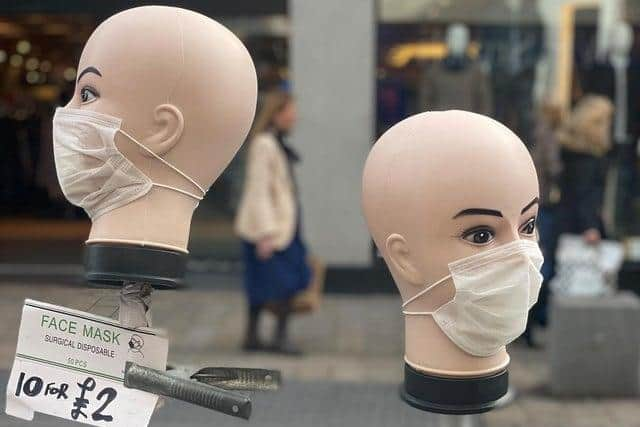Face coverings to be made compulsory on public transport in England
and live on Freeview channel 276
Grant Shapps said "every precaution" must be taken as passenger numbers are expected to increase when lockdown measures are further eased.
Currently passengers are advised to wear a face covering but are not stopped from travelling without one.
Advertisement
Hide AdAdvertisement
Hide AdHowever, it will be compulsory for people to wear face coverings on buses, trains, aircraft and ferries from June 15.
Very young children, disabled people and those with breathing difficulties will be exempt, he said.
Speaking at the daily coronavirus briefing, Mr Shapps said face coverings would be "a condition of travel" and not wearing one could "ultimately" lead to a fine.
He added: "Alongside transport operators, this will be enforced by the British Transport Police if necessary, but I expect the vast majority of people won't need to be forced into this."
Advertisement
Hide AdAdvertisement
Hide AdMr Shapps said surgical masks must be kept for clinical settings and instead travellers should wear the kind of face covering that can be made at home, including a scarf, piece of cloth or mask.


The government says they are "marginally beneficial as a precautionary measure", and states that evidence suggests face coverings do not protect the wearer, but may protect other people if he or she is infected.
London mayor Sadiq Khan was among those who have been lobbying the government to make face coverings mandatory on public transport.
He said ministers have "finally seen sense", adding that there is "a large body of evidence" that face coverings can help stop the spread of coronavirus.
Advertisement
Hide AdAdvertisement
Hide AdTransport unions had also urged ministers to enforce the wearing of face coverings after the deaths of dozens of workers.
Mick Cash, General Secretary of the Rail, Maritime and Transport union, said the announcement was "long overdue".
Mr Shapps said on May 12 that 42 TfL (Transport for London) workers and 10 mainline rail staff had died after being infected by coronavirus.
People are advised to wash their hands or use hand sanitiser before a face covering is put on or taken off, and coverings should also be washed regularly.
Advertisement
Hide AdAdvertisement
Hide AdThe announcement came as the UK recorded the deaths of another 176 people who tested positive for coronavirus, taking the total number of deaths in the UK to 39,904.
Face coverings: What are the new rules?
Here are five key questions about the use of coverings and masks answered:
- Why are face coverings being made compulsory on public transport?
The Government states that, while wearing a face covering does not protect the wearer, it may protect others if people are infected but have not yet developed symptoms.
- Where else should they be worn?
Advertisement
Hide AdAdvertisement
Hide AdCurrent advice is for face coverings to be worn in enclosed spaces, which also includes some shops.
People are not being told to wear them outdoors, while exercising, in schools or offices.
- If I develop Covid-19 symptoms, can I still go out if I wear a mask or covering?
No. People with coronavirus symptoms and their household should isolate at home.
- What sort of face coverings should I use?
Advertisement
Hide AdAdvertisement
Hide AdScarves, cotton home-made coverings that cover nose and mouth and other bought masks that are not ones used by the health service are fine.
Officials said that people can make coverings at home, but added that "the key thing is it should cover your mouth and nose".
- Are there any downsides to using face coverings?
Concerns have been raised that they could give a false sense of security and mean that people are less stringent with other preventative measures such as social distancing and hand hygiene.